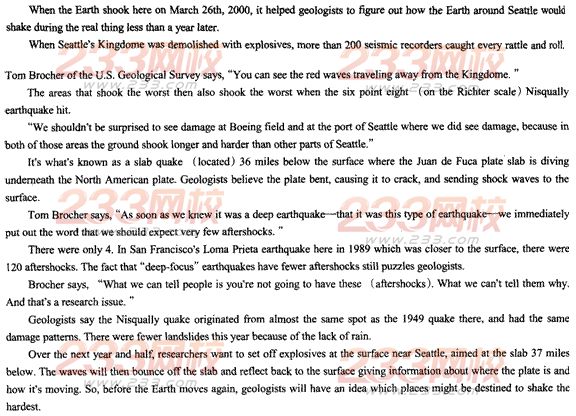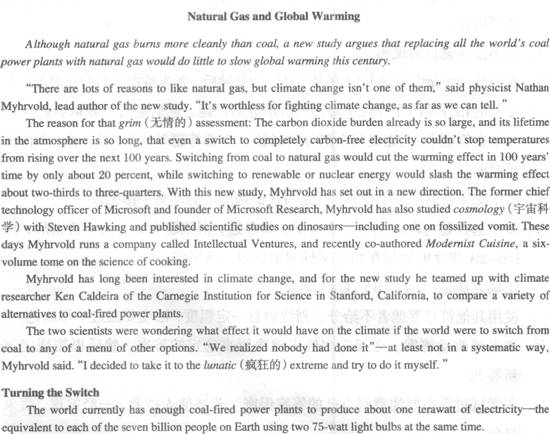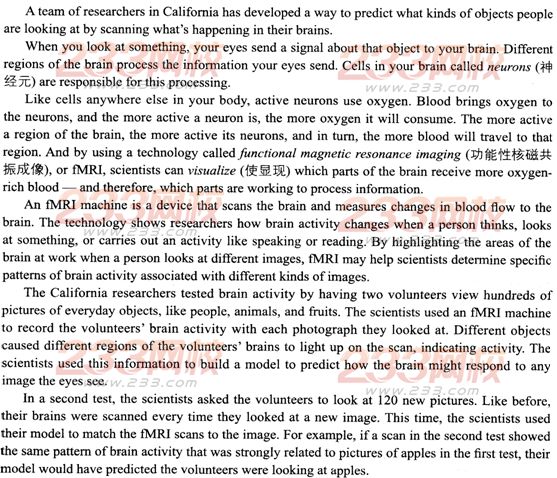цЈчАхЈчфНчНЎяМ233чНц Ё >> шБшЏхчКЇшшЏ >> шБшЏхчКЇщЂхК >> цЏцЅфИчЛ >> цчЋ х
хЎЙ
2014хЙДшБшЏхчКЇшшЏцЏцЅфИчЛ(5ц22цЅ)
хЏМшЏЛ:
хЈчКПцЕшЏцЌцЙуцЏцЅфИчЛушЏщЂяМхЏцЅччцЁхшЇЃцяМхЙЖфПчхщЂшЎАхН >> хЈчКПхщЂ
- чЌЌ1щЁЕяМчЛфЙ шЏщЂ
хщЁЙщцЉщЂ
1уц ЙцЎфЛЅфИшЕцяМхчщЂу


Project X is intended for helping the young African immigrants to_________яМ
AяМ A)get over language barriers
BяМ B)overcome tough problems
CяМ C)enrich after-school life
DяМ D)become more creative
2уц ЙцЎфЛЅфИццхчщЂяМ

According to the passage, what caused the Earth around Seattle shake on March 26th, 2000?

3уц ЙцЎццхчщЂяМ


When Nathan Myhrvold saysяМтThere are lots of reasons to like natural gasяМbut climate change isnтt one ofthemяМт(Line lяМParagraph l)he means__________яМ
AяМnatural gas is to blame for climate change
BяМusing natural gas does not help fight climate change
CяМitтs not a good idea to use natural gas instead of coal
DяМnatural gas does not bum more cleanly than coal
4уц ЙцЎфИхццшЏЗхчщЂяМ

What is responsible for processing a signal sent by people's eyes?
AяМOxygen-rich blood.
BяМNeurons in the brain.
CяМA small region of the brain.
DяМThe central part of the brain.
хЁЋчЉКщЂ
5у We strongly suggest that___________. (фЛфЛЌхАНхПЋщхКцАччЏхЂ)яМ
6уAromatherapy is______________________(фИфЛ цхЉфКцОцОяМшфИхЏЙхшЅфЙхОцц)яМ
7уMany patients insist on having watches with them in hospitalяМeven though __________(фЛфЛЌфИщшІщЕхОЊфНцЏцЖщДшЁЈ)яМ
8уWhat does the pharmacotherapy of insomnia focus on?

чЎчщЂ
9учАхЈчНфИшДчЉцЏхЗВчЛцфИКфИчЇцЖхАяМчНфИшДчЉцхОхЄхЅНхЄяМфНфЙцфИхАщЎщЂяМцчхЛКшЎЎцЏфЛфЙяМ
10уDirectionsяМFor this pnnяМyou are allowed 30 minutes to write a short essay entitled What Electives to ChooseяМYou should write at least l20 words but no more than l80 wordsfollowing the outline given below in ChineseяМ
1яМххЄЇхІхМшЎОфКхчЇхц ЗчщфПЎшЏОяМ
2яМхІчх фИКхчЇхх щцЉфКфИхчщфПЎшЏОяМ
3яМфЛЅфН шЊхЗБфИКфОтІтІ
1уц ЙцЎфЛЅфИшЕцяМхчщЂу



Project X is intended for helping the young African immigrants to_________яМ
AяМ A)get over language barriers
BяМ B)overcome tough problems
CяМ C)enrich after-school life
DяМ D)become more creative
2уц ЙцЎфЛЅфИццхчщЂяМ

According to the passage, what caused the Earth around Seattle shake on March 26th, 2000?

3уц ЙцЎццхчщЂяМ


When Nathan Myhrvold saysяМтThere are lots of reasons to like natural gasяМbut climate change isnтt one ofthemяМт(Line lяМParagraph l)he means__________яМ
AяМnatural gas is to blame for climate change
BяМusing natural gas does not help fight climate change
CяМitтs not a good idea to use natural gas instead of coal
DяМnatural gas does not bum more cleanly than coal
4уц ЙцЎфИхццшЏЗхчщЂяМ

What is responsible for processing a signal sent by people's eyes?
AяМOxygen-rich blood.
BяМNeurons in the brain.
CяМA small region of the brain.
DяМThe central part of the brain.
хЁЋчЉКщЂ
5у We strongly suggest that___________. (фЛфЛЌхАНхПЋщхКцАччЏхЂ)яМ
6уAromatherapy is______________________(фИфЛ цхЉфКцОцОяМшфИхЏЙхшЅфЙхОцц)яМ
7уMany patients insist on having watches with them in hospitalяМeven though __________(фЛфЛЌфИщшІщЕхОЊфНцЏцЖщДшЁЈ)яМ
8уWhat does the pharmacotherapy of insomnia focus on?

чЎчщЂ
9учАхЈчНфИшДчЉцЏхЗВчЛцфИКфИчЇцЖхАяМчНфИшДчЉцхОхЄхЅНхЄяМфНфЙцфИхАщЎщЂяМцчхЛКшЎЎцЏфЛфЙяМ
10уDirectionsяМFor this pnnяМyou are allowed 30 minutes to write a short essay entitled What Electives to ChooseяМYou should write at least l20 words but no more than l80 wordsfollowing the outline given below in ChineseяМ
1яМххЄЇхІхМшЎОфКхчЇхц ЗчщфПЎшЏОяМ
2яМхІчх фИКхчЇхх щцЉфКфИхчщфПЎшЏОяМ
3яМфЛЅфН шЊхЗБфИКфОтІтІ
What Electives to Choose
____________________________________________________________________________________________________________________________________________________________________________________________________________________________________________________________________________________________________________________________чИх
ГцЈш
шЏОчЈх
шДЙшЏхЌ
| ПЮГЬзЈвЕУћГЦ | НВЪІ | дМл/гХЛнМл | УтЗбЬхбщ | БЈУћ |
|---|---|---|---|---|
| ЁЖДѓбЇгЂгяЫФМЖЁЗОЋЦЗАрЃЈАќРЈгяЗЈЁЂДЪЛуЁЂЗвыЃЉ | ЖЁбЉУї | ЃЄ100 / ЃЄ100 |  |
БЈУћ |
| ЁЖДѓбЇгЂгяЫФМЖЁЗОЋЦЗАрЃЈдФЖСРэНтЃЉ | ЖЁбЉУї | ЃЄ100 / ЃЄ100 |  |
БЈУћ |
| ЁЖДѓбЇгЂгяЫФМЖЁЗОЋЦЗАрЃЈЬ§СІЃЉ | ЖЁбЉУї | ЃЄ100 / ЃЄ100 |  |
БЈУћ |
| ЁЖДѓбЇгЂгяЫФМЖЁЗОЋЦЗАрЃЈаДзїЃЉ | ЖЁбЉУї | ЃЄ100 / ЃЄ100 |  |
БЈУћ |
ччЙфИщЂ







